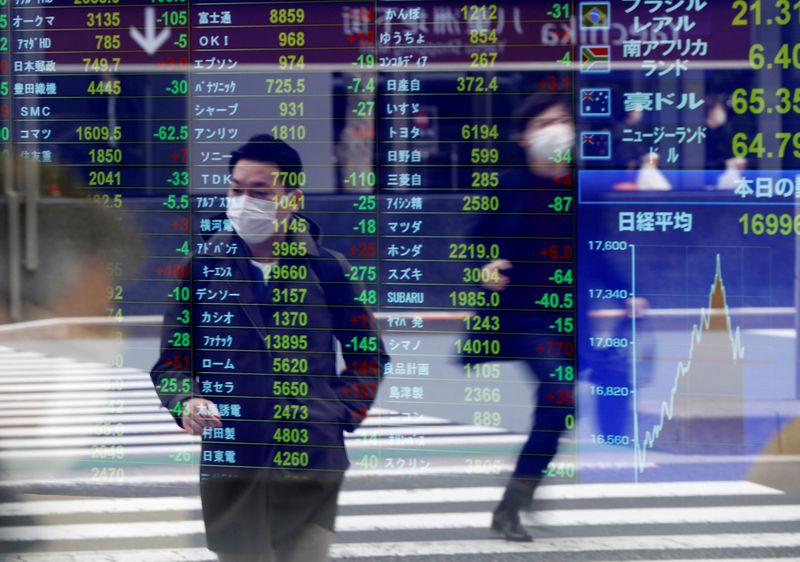NEW YORK (Reuters) - Asian stocks were set for a modest bounce on Tuesday as U.S. stock futures edged higher, although fears the coronavirus could drag on the global economy for months are likely to temper investor confidence.
E-Mini futures for the S&P 500 nudged 0.3% higher, while Nikkei futures pointed to an opening gain of about 70 points.
All eyes will be on China's trade data, to be released on Tuesday, which is expected to show exports tumbling 14% in March from a year ago, as the coronavirus shutters businesses around the world, crippling demand and economic growth.
Indeed, some analysts are saying any optimism over signs the outbreak may be peaking in hard-hit cities is quickly being offset by concerns that it may be awhile yet before businesses recover.
"Signs of the outbreak peaking -- or at least slowing in some regions -- have started to turn the talk to when restrictions on activity can be eased," analysts at JPMorgan (NYSE:JPM) said in a note.
"Short of the unlikely near-term event of a vaccine or significant herd immunity, restarting economies...may be challenging," the analysts wrote.
Wall Street indexes ended mixed on Monday with the Dow and S&P 500 falling while a 6.2% gain in Amazon (NASDAQ:AMZN) shares helped the Nasdaq end higher.
In Asia, an expected trade slump in China will reinforce views that the world is headed for a global recession this year, despite an unprecedented burst of stimulus from policymakers in the last two months to shore up growth.
Many analysts already expect China's economy, the world's second-largest, to have contracted sharply in the March quarter for the first time since at least 1992. China reports its first-quarter gross domestic product data on April 17.
Elsewhere, Britain's finance minister told colleagues the UK economy could shrink by up to 30% this quarter due to the coronavirus lockdown that has shuttered businesses.
In another sign of worries about struggling global demand, oil prices barely reacted to a global deal to cut output by a record amount of nearly 10% of world supply. U.S. crude was up just 39 cents at $22.8, well under its January peak of $63.27.
A skittish market helped gold prices to cling to highs not seen in more than seven years at $1,718.46 an ounce.
In the United States, which has recorded the highest number of casualties from the virus in the world, President Donald Trump said on Monday his administration was close to completing a plan to re-open the U.S. economy, even though some state governors have signalled that the decision on when to restart businesses lay with them.
The dollar continued to extend losses on the back of the U.S. Federal Reserve's massive new lending programme. The dollar index fell 0.105%, while the Japanese yen was flat versus the greenback at 107.68 per dollar. The euro was also little changed against the dollar at $1.0917.

The yield for benchmark 10-year U.S. Treasury notes edged higher to 0.7697%.
